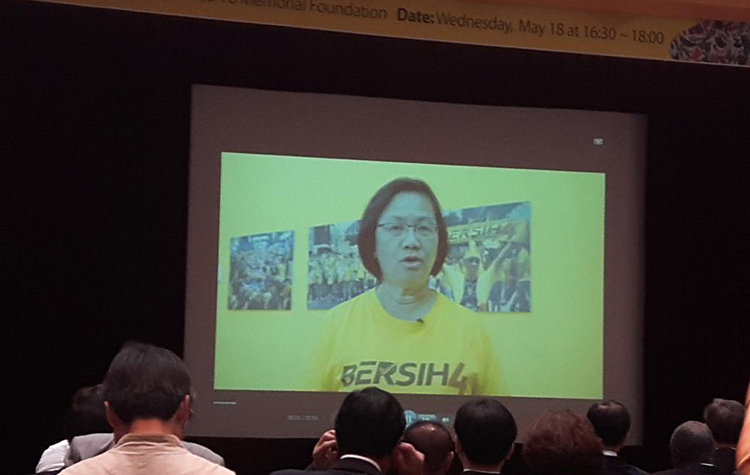2016 Gwangju Prize for Human Rights awardee, Maria Chin Abdullah was not allowed to travel to South Korea. The Malaysian authorities should stop arbitrary travel ban on the Coalition for Free and Fair Elections (Bersih) democracy activists who have been calling on free and fair elections and democracy in Malaysia.
- On 15 May 2016, Malaysian authorities stopped Bersih democracy activist Maria Chin Abdullah from travelling to South Korea. She was going to receive the 2016 Gwangju Prize for Human Rights on behalf of Bersih 2.0. Solidarity for Democratization Movement in Asia (SDMA) condemns the Government of Malaysia’s continuing harassment and intimidation against Bersih democracy activists. The Malaysian authorities should respect right to freedom of movement of Bersih democracy activists.
- Bersih means ‘clean’ in Bahasa Malaysia. Bersih has been calling for law reforms on free and fair elections since 2010 through peaceful campaigns. Approximately 500,000 people in 65 countries around the world joined the latest Bersih solidarity protests in 2015. 2016 Gwangju Prize for Human Rights is awarded to Bersih due to their constant struggle for human rights and democracy in Malaysia.
- Despite of the fact that international community has been supporting Bersih, Malaysian government has branded Bersih as unlawful protests. During the Bersih protest in 2011, 1,667 were arrested while around 50,000 people participated. In 2012, police used excessive force towards peaceful demonstrators including using pepper spray to disperse the crowd. Furthermore, in December 2015 Hishamuddin Rais, a social activist and member of Bersih 2.0 Steering Committee was also refused to travel outside Malaysia. He was scheduled to travel to South Korea as a part of international human rights monitoring delegation. Other Bershi activists Mandeep Singh, Adam Adil and Nik Nazmi have been also subject to judicial harassment under the Sedition Act and Peaceful Assembly Act.
- Recently Malaysian immigration introduced a policy that if someone disparages Malaysian government while abroad, the person would be barred from leaving the country for 3 years upon their return. SDMA would like to remind Malaysian authorities that the right to freedom of movement is stipulated under the Article 9 of Malaysian Constitution as well as Universal Declaration of Human Rights. We urge Malaysian government to stop harassing Bersih democracy activists and immediately lift the travel ban against them. Instead of blaming democracy activists for disgracing reputation of Malaysia, the authorities should uphold democratic values and promote human rights.
Solidarity for Democratization Movement in Asia (SDMA)
Asian Forum for Human Rights and Development (FORUM-ASIA), Regional Asia / Initiatives for International Dialogue (IID), The Philippines / Imparsial, the Indonesian Human Rights Monitor, Indonesia / Odhikar, Bangladesh / People’s Solidarity for Participatory Democracy (PSPD), Republic of Korea / The May 18 Memorial Foundation, Republic of Korea.
The Solidarity for Democratization Movements in Asia (SDMA) has been launched at the ‘2010 GWANGJU ASIA FORUM’ on 21st May 2010, in conjunction with the 30th anniversary of the May 18 Gwangju Democratic uprising. The May 18 Memorial Foundation has been hosting the International Network Meeting for the past 11 years as a foundation process to establish a regional network for acting among democracy advocates, human rights defenders and social movement activists based on the collective experience of the struggle for democracy and human rights and a sense of solidarity created among the participants. Its main purpose is to promote regional cooperation for democratization based on people’s rights and empowerment vis-à-vis repeated violence and atrocities inflicted by states as experienced in different societies in Asia. The SDMA will inclusively act for Asian solidarity from the bottom up to protect and promote democracy and human rights.



